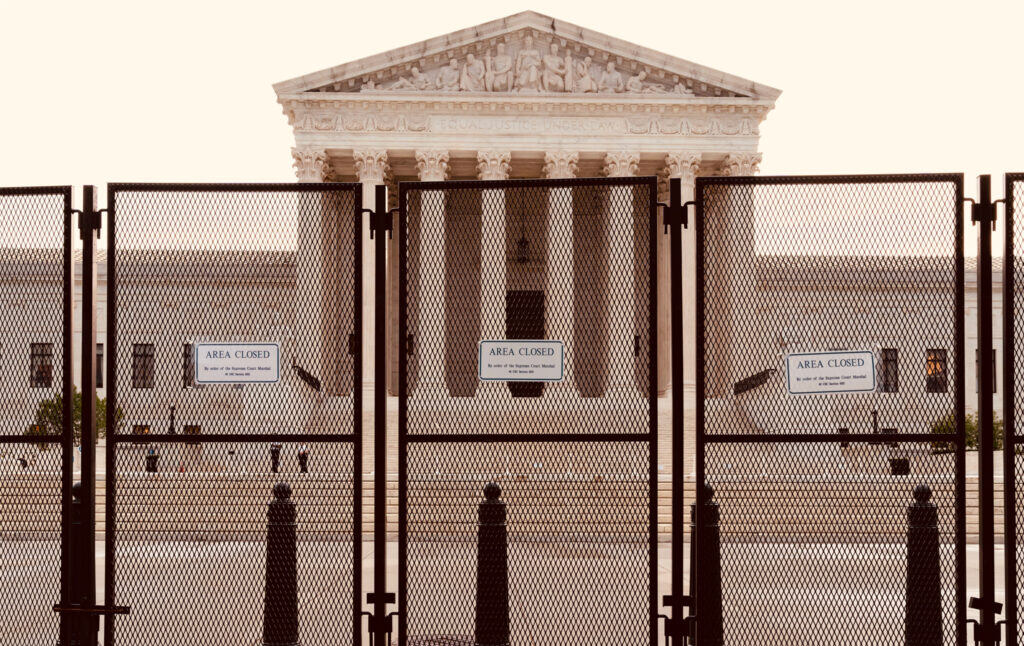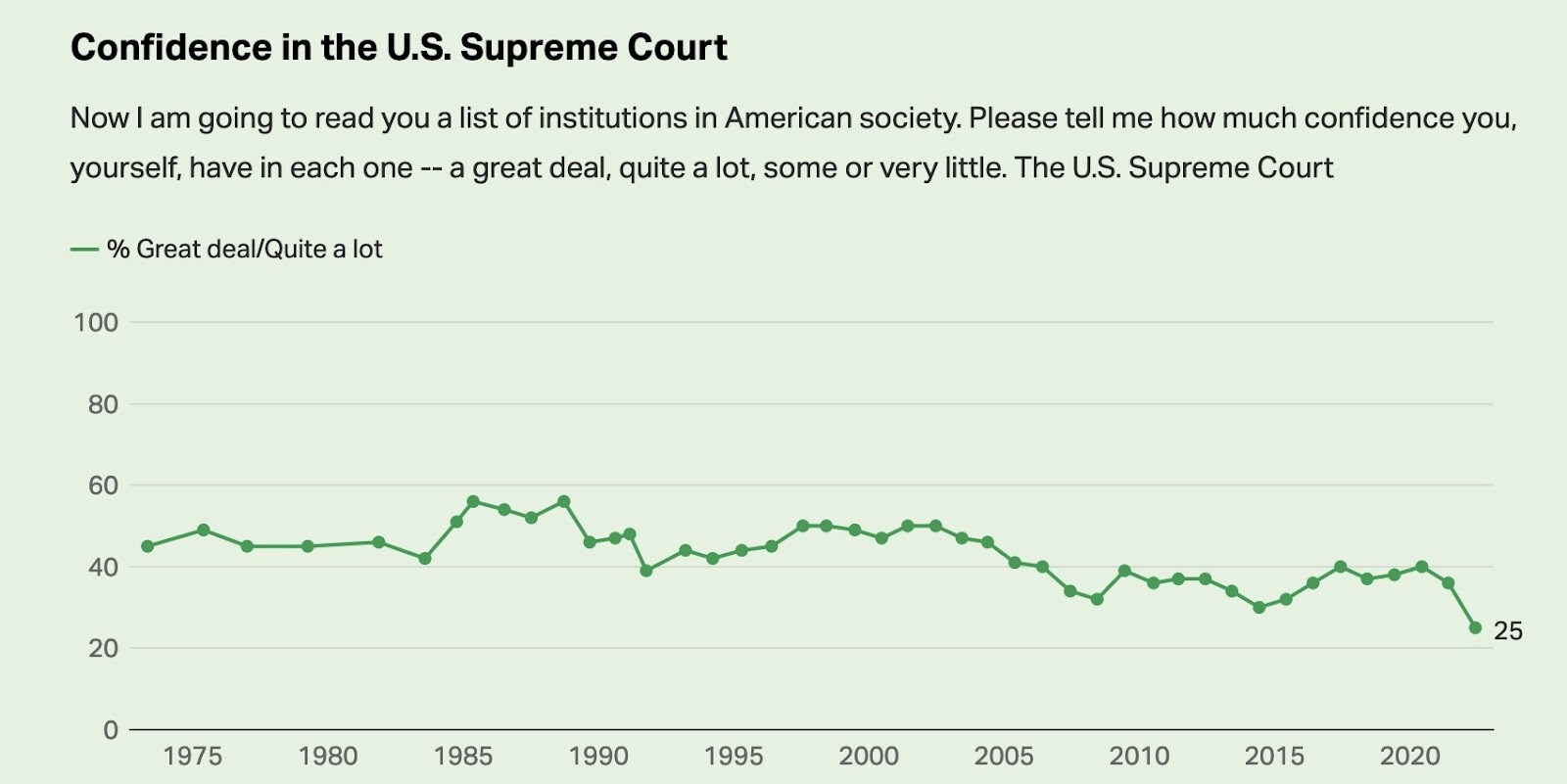
The Supreme Court Has Destroyed Its Legitimacy and There Is No Reason to Respect It
When an unelected conservative majority simply imposes the right’s policy preferences by fiat, there is little reason for the rest of us to respect the Court’s authority.
There has always been a certain amount of artifice in what Supreme Court justices do. Whether they are conservatives or liberals, they pretend that their personal moral and political values are irrelevant to their votes, and that they are just Following The Law. They delude themselves into thinking they are mere “umpires” who might have differing legal theories but are certainly not partisan. They try to get the public to accept this myth, because if we did think of the justices as mere “robed legislators,” there would be little reason to treat their decisions with deference and respect. It is necessary for the court’s legitimacy that the public not see its rulings as the mere imposition of certain partisan policy preferences by an unelected council who are only in their positions for arbitrary reasons (e.g., because of the timing of another justice’s death).
The desire to preserve the myth of a legitimate court was one reason Ruth Bader Ginsburg refused to retire. She felt it “belittles and diminishes the court to have retirements so obviously timed for political reasons.” It also explains why some liberal legal professionals praised the nominations of Brett Kavanaugh and Amy Coney Barrett to the Supreme Court. Their politics and personal beliefs were seen as irrelevant. Instead, their qualifications and intelligence were what mattered. Yale Law School’s Akhil Amar predicted that Kavanaugh “will be a pro-intellectual and anti-polarizing force on the Court.” The Washington Post ran a law professor’s op-ed called “I’ve known Amy Coney Barrett for 15 years. Liberals have nothing to fear.” The author argued that as a justice, “Barrett would not draw on any extralegal source of authority—be it religious, moral or political.”
These predictions were obviously lies or unbelievably naive delusions. As I documented at great length at the time, both Kavanaugh and Barrett both had long track records of making conservative decisions that obviously incorporated their value judgments. The justices themselves, during their confirmations, pretended they weren’t going to be partisan (Kavanaugh was said to have called Roe v. Wade “settled law” in an August 2018 conversation with Sen. Susan Collins; yet the New York Times, reporting on his confirmation hearings a month later, mentioned documents revealing that Kavanaugh had, in the past, questioned whether Roe was indeed “settled law.” In any case, he clearly didn’t actually think the “important precedent” was worth upholding—although that somewhat paled next to the many other egregious instances of outright perjury in his testimony defending himself against allegations of past sexual assault). The pretense of neutrality was obviously untrue. Donald Trump had publicly promised that the justices he appointed would overturn Roe. It’s reasonable to doubt that any statement uttered by Donald Trump could ever be accurate, but this was one pledge he followed through on. Lindsey Graham, in his recent debate with Bernie Sanders (in which Sanders cleaned Graham’s clock), boasted openly about having a “conservative” Supreme Court. So much for objective “umpires” merely applying the law.

It should surprise nobody, then, that when right-wing justices dominate the Court, they do what the Supreme Court did this week, when it declared even modest gun control measures unconstitutional and eliminated the constitutional right to an abortion.
But even if it’s not shocking, it’s important to take stock of what this means: because the Court has the ultimate authority to decide whether democratically decided-upon laws are upheld or struck down (a power it arrogated for itself in Marbury v. Madison, but which appears nowhere in the Constitution), the Court as an institution has almost unrestricted power, despite having no democratic accountability. When the Court is full of mushy moderates who worry about not doing anything too rash, this near-absolute power doesn’t cause too much public concern. But now that the Court is stuffed with hardcore reactionaries, we see plainly what an extremely dysfunctional and unjustifiable institution it is.
Conservatives justify the Court’s decision by saying that there is nothing political here. Liberal lawyer Neal Katyal suggested there was something contradictory about the conservative Court granting the right to the concealed carry of firearms while revoking the right to an abortion. But for conservatives there is no mystery: the Constitution has an amendment protecting the right to bear arms, but no amendment mentioning the right to terminate a pregnancy. Conservatives argue that this settles the issue. The justices are just applying the Constitution. Politics? What politics?
As I have pointed out before, however, there is a serious problem with imposing the Constitution of 1787 on the public of 2022, namely the fact that all of the Constitution’s provisions were imposed on the public by force rather than consent. The Founding Fathers treated women, Black people, and Native Americans as subhumans ineligible to participate in self-governance. As a result, the Constitution’s provisions do not reflect the “consent of the governed” and are owed little respect. (When Abigail Adams pleaded with her husband to “remember the ladies” in drafting the laws, he laughed at her and replied “we know better than to repeal our masculine systems,” saying this would be “the despotism of the petticoat.”) Because the Constitution was made deliberately difficult to alter, the result of applying an “originalist” framework is that the public is forever trapped under undemocratic and illegitimate laws.
Both the abortion opinion and the gun rights opinion, for instance, dwell heavily on what the historic regulations in both these areas was. Clarence Thomas argues that gun regulations of today must comport with historical American practice, and Samuel Alito argued that abortion bans are consistent with history, pointing out that it was only in the mid-20th century that the idea of a right to abortion arose. But looking to “tradition” is a problem, because traditional laws were made without adequate public consent. The reason the “mid 20th century” was when the idea of a right to abortion arose is that in the mid-20th century, we had a women’s liberation movement that rose up against a centuries-old patriarchy. It is no more legitimate to determine women’s rights today by looking at women’s rights in the 19th century than it would be to decide which rights Black people should have by asking which rights Thomas Jefferson thought they should have.
The belief that judges shouldn’t act as dictators does not mean that every judicial opinion should merely defer to public opinion polls. The job of a court will always involve a willingness to thwart “majority opinion” in certain cases; a responsible judge upholds the rights of a defendant even if there is an angry lynch mob at the courthouse door. But this doesn’t mean that a court has the right to wilfully trample on the democratic process and force the public to be subjected to a set of laws that it did not vote on, that were imposed by a small group of propertied white men, and that were deliberately designed to be difficult to alter. A judge that simply defers to polls is not doing their job, but neither is a judge that totally disregards the question of whether the public actually, for example, would prefer not to have their constitutional rights taken away.
Clarence Thomas has suggested that, having struck down Roe, he would next like to see the right to contraception, same-sex marriage, and even same-sex relationships eliminated. That shouldn’t be surprising: Thomas believes that the Court should only uphold the rights people had in 1787, plus those explicitly added to the Constitution through the amendment process. No right to same-sex relationships or contraception has been added through the amendment process, so even if it would be extremely unpopular to take these rights away, Thomas believes the Supreme Court should do it. And he won’t believe that there’s anything in the least “political” about doing it, even though the decisions squarely align with conservative policy preferences.
But in trying to force women and LGBT people to live under 1787’s legal framework, the Court risks running into a serious objection: there is no reason for the people subjected to this regime to obey it. The Supreme Court has the legal power to take away women’s right to an abortion. But in doing so, it has no legitimacy. That is, there is no reason why a woman should assent to the Court’s assertion that it is entitled to let the state criminalize her abortion.
The Supreme Court is playing a dangerous game here, because the more it seems like a group of arbitrarily-empowered reactionaries with absolute authority to make 2022 look like 1787, the less the public is going to be inclined to accept its rulings. Even leaving aside the fact that the Court’s decisions fail as originalism (how on earth could a document written centuries ago resolve whether an AR-15 should be allowed?), the insistence on imposing an undemocratic order will be met with discontent and resistance. Already, we see that approval of the Court has slipped to historic lows:

By being nakedly reactionary, the Court is risking its reputation, and thereby its power. You can sometimes convince people that wearing a robe gives you authority and credibility, but if you get too outlandish in your pronouncements, they will wonder whether the robe actually means much. As the Court continues to defy the popular will and produce extreme and harmful outcomes (more mass shootings, women thrown in jail for miscarriages), some people may begin to ask why we owe deference to Supreme Court opinions at all. Some states may flirt with the idea of simply defying the Court, which has no army and cannot enforce the laws itself. The idea of simply ignoring the Court is frightening—leftist writer Carl Beijer has warned that it is “dangerous—because it inches us closer to a situation in which the rule of law breaks down altogether. But nobody is morally bound to obey the Supreme Court absolutely. If the Supreme Court ordered us to commit an atrocity, we would be obligated to practice civil disobedience. The correct response to atrocious racist decisions like Dred Scott or Plessy v. Ferguson would have been for state governments to simply ignore them. Dred Scott, remember, ruled that legislators could not free people from enslavement and had to recognize the rights of slave-holders. Any moral person in government would simply ignore such a ruling, because of the criminal wrong there would be in handing a person over to an enslaver. This would be so even if the Supreme Court had been correct on an originalist reading of the Constitution. Nobody is justified in doing atrocious things just because the (illegitimate) laws of a prior generation of property-owners required said atrocities.
Of course, in practice outright defiance of Supreme Court rulings by state governments is somewhat unlikely, though on guns they should keep passing new laws and challenging the court to strike them down. We ultimately need to put more justices on the Supreme Court and readjust the partisan balance, because the Supreme Court simply cannot survive if it has no democratic legitimacy, which it doesn’t if it is just a conservative think tank with absolute power. Because the Court has such extraordinary power, and because Democrats are generally cowardly and ineffectual and far too devoted to procedural norms, it will be difficult to tame the Court’s power. But we must begin by recognizing that it is an entirely illegitimate institution in dire need of reform, and that its decisions are nakedly partisan and do not deserve a shred of respect.


